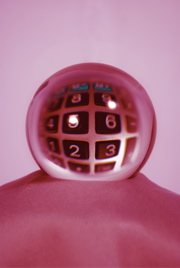A magazine where the digital world meets the real world.
On the web
- Home
- Browse by date
- Browse by topic
- Enter the maze
- Follow our blog
- Follow us on Twitter
- Resources for teachers
- Subscribe
In print
What is cs4fn?
- About us
- Contact us
- Partners
- Privacy and cookies
- Copyright and contributions
- Links to other fun sites
- Complete our questionnaire, give us feedback
Search:
I hear a tall dark handsome stranger...
Your horoscope for today

"You want others to like you, but inside you tend to be critical of yourself. You can be outgoing and the 'life and soul of the party' but sometimes you feel reserved and simply enjoy your own company. At times you have serious doubts as to whether you have made the right decision or done the right thing."
Sound like you?
Chances are you think it does. It's called the Barnum Effect after the US showman P.T. Barnum and many people think it's why horoscopes 'work'. The Forer effect, to give it its proper scientific name, is named after the psychologist Bertram R Forer who first investigated it in 1948. What he found was that people thought that statements about their personality were very specific to them, when in fact the statements were vague and could apply to a whole range of people.
Look at the 'horoscope' again, and you can see how these statements are constructed. They tend to contain generalities, and also a sort of two sidedness, 'You seem to like the colour red, but sometimes you don't' sort of things. In one TV 'experiment', a 'mystic' described the personalities of a series of women he hadn't previously met. Afterwards they thought he had described them amazingly well. It made some believe he must really be psychic. In fact he had just given each of them the same Barnum description!
So why does it work? One of the common explanations is that the statements tend to appeal to our vanity, wishful thinking or hopes, so our brains tend to remember the parts we want to, the good bits, and ignore the parts we don't want to hear. This sort of selectiveness in the way we store information could be related to the strategy our brains use to survive and make sense of the world. We are bombarded by information constantly, and our brains just can't take it all in. We select what we want to store, and in the Barnum effect we filter out the parts we don't want.
Cocktail Party
Another example of this sort of selective effect in brain processing is the 'Cocktail Party effect'. You've probably experienced this yourself, the effect that is, not the party. If you're in a crowded room with lots of people having conversations your brain ignores the voices. It becomes background noise. However the moment someone mentions your name, 'your ears prick up'. Suddenly your brain hears something it's interested in, 'a good bit', and you focus in on that conversation. In fact your brain has been processing all those voices all the time. It's just there wasn't anything interesting relating to you in the conversation so it was filtered out.
Just give the nod
The cocktail party effect is also being explored by researchers as a way to help people interact with mobile gadgets like mobile phones, radios and iPods without bumping into lampposts. Using 3D sound, different things can be made to appear to be coming from different positions around your head. Nodding towards the sound of lightning switches to a weather report, say, without you taking your eyes off the pavement.
Looking into the future
By understanding how our brains select the information to look at, listen to or believe could help computer scientists develop new ways to process massive amounts of data in the future as well as being used to develop new ways of interacting with computers.


